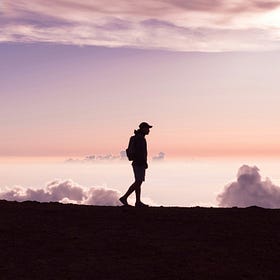Seeing this title, you might find it somewhat familiar. Haruki Murakami once wrote "What I Talk About When I Talk About Running," and what I want to share is "What I Think About When I Walk." The genesis of this topic is quite interesting—one evening, I was lying in bed listening to music, eyes closed, preparing to rest but not wanting to fall asleep immediately. In this relaxed state, this inspiration suddenly emerged.
Recently, I wrote an article about "Task Switching, Attention Residue, and State Reset,” which mentioned my three walking strategies. Another reason that prompted me to think about this topic was a reader's comment mentioning that "self-awareness is rare," which made me very happy. All these related elements—the title association, the relaxed setting, reader feedback—all contributed to the birth of this article to some extent.
After thinking of these related ideas, I wrote down a few keywords as a draft outline on my phone, then used voice notes to record these thoughts based on this draft. This is also the method I've been using recently for writing articles, basically flowing smoothly in one go.
Why Walk: Fatigue After Deep Work
For me, walking mainly stems from the need for state reset after deep work. Before walking, I usually engage in deep work that requires high concentration: organizing notes, arranging tasks, executing tasks.
Organizing notes might involve expanding previously recorded keywords and drafts into complete notes, whether through typing or voice notes. It's important to organize those important notes quickly to avoid forgetting the meaning of those keywords and drafts after a long time, which would result in the loss of important ideas.
Arranging tasks involves extracting tasks that need to be executed from various notes—meeting notes, project notes, discussion notes—and then scheduling their execution: either creating reminders, linking them to existing tasks and notes, linking them to Kanban boards, or arranging them in other ways.
Executing tasks themselves, such as developing algorithms, testing algorithms, generating results, analyzing results, writing articles, etc., all fall under the category of deep work. Actually, strictly speaking, organizing notes and arranging tasks are themselves tasks too.
After one to two hours of deep work, I often feel very tired, or at least notice my focus declining to the point where I can't continue working with the current level of concentration and intensity. Therefore, I realize I need to adjust my state. At this point, walking becomes my preferred method of state reset in daily life.
I choose walking for a simple reason: walking is simple enough. I just need to open the door and start moving my legs—no prerequisites or complex preparation required.
Of course, personally, I prefer to walk in places where I can get close to nature, because in such environments, I find it easier to feel relaxed. Reflecting on it now, another reason might be that natural environments contrast greatly with the environment where I do deep work. Perhaps this makes it easier for me to psychologically feel that I've distanced myself from my previous work state, thus allowing me to feel more relaxed.
Sometimes, limited by the surrounding environment, I also choose to walk in other settings. For example, once when working in the city center, I could only walk along the streets. Walking along the roadside, listening to traffic sounds, watching pedestrians, passing by parks—perhaps because the change in walking scenery helps me break away from the work environment, it also makes me feel relaxed.
The Content of Walking: Sensory Experience and Relaxed State
When walking, I choose an appropriate route from three strategies based on my current state, time, and other circumstances.
During the process of walking along the selected route, I feel the wind blowing across my skin, listen to music or podcasts, and sometimes listen to nothing at all, just quietly hearing the surrounding ambient sounds. Sometimes there's sunlight falling on me, and I can look at the surrounding green trees, or snow-covered ground in winter.
My persistence in walking might even reach a level of obsession—even when it's very cold outside in winter, with lots of snow on the ground that's sometimes slippery, I still walk along my predetermined route, just being extra careful. I've even slipped and fallen a few times because of this, which shows that walking also has its risks 😂. Of course, if it's raining or snowing heavily, especially when it's very cold, I might not go outside to walk. But if it's just light snow or drizzle, as long as it won't get me soaked or make me catch cold, I'll still go out for a walk.
While editing the previous paragraph, I remembered that during the pandemic, I seemed to have heard a podcast episode about someone walking indoors, which felt quite relevant and interesting. Reflecting now, the reason I thought of that indoor walking story was probably because in the previous paragraph I mentioned my obsession with walking.
Unconscious Thinking: Serendipitous Moments of Inspiration
What I might think about during walks is not the purpose itself, but rather random and serendipitous. For me, the main purpose of walking is to reset my physical and mental state, so that after walking, I can better return to my original work state. Therefore, I don't deliberately force myself to think about anything while walking.
Often, it's precisely because I don't force myself or deliberately think about certain things that some interesting, unexpected inspirations emerge. For example, if a task I was executing before the walk or an algorithm I was developing got stuck, some new inspirations might emerge during the walking process; or some things I've been thinking about recently, some notes I've recorded, might also generate related thoughts.
Sometimes I recall recent discussions with colleagues and friends, and suddenly the scene of that discussion emerges in my mind. I remember some keywords, and then during the walk, I continue to expand along those keywords and previous lines of thinking.
I might also think about tasks and projects that need to be advanced in the coming period, such as what to do in the next month, what to do in the next quarter. I might think of some important time points in my calendar and reminders, then work backwards to think about how I should proceed next.
Sometimes I think of related ideas from long ago. When recording current thoughts, I might not realize I had related thoughts before, but when organizing other notes later, I discover that I seemed to have used this keyword in the title or content of some previous note, and had similar thoughts. Then I can link to that previous note. As for how to find previous related notes, I've provided detailed introductions in previous articles, so I won't elaborate here.
Sometimes I might simply think of a certain keyword, which generates related thoughts. Sometimes scenes from movies or TV shows suddenly emerge in my mind (you can see how many shows I've watched 😂). For example, once when I was riding a bicycle on the street, I thought of a TV series called "High Maintenance", because the main character rode a bicycle around the city delivering things, which was quite interesting. Then there would be some extended thoughts.
For a period when I was developing an Obsidian plugin, I would suddenly think during walks about what a certain interface of this plugin should look like, and that image would appear before my eyes. Then I would record it in text. Unfortunately, we can't record a snapshot of images that flash in our minds, but can only record them in text. Of course, you could also draw them out, but I don't have that talent.
Thinking During Walks: A Real Case
Let me share a specific walking experience. That day I originally planned to walk for 10-15 minutes, taking the shortest route, but midway I changed my mind. I realized I needed more time to reset my state, so I decided to switch to the route that takes 30-40 minutes.
The fundamental reason that prompted me to make this change was: I looked at the time and found that even if I walked for 30-40 minutes, I could still focus on work for an hour after returning, then go have lunch. During the meal, I could review and think about previous work content; of course, I generally don't do this deliberately, but often think of it randomly while listening to music or podcasts during meals. After eating, I could continue with deep work. So, changing the walking plan was still quite a good time arrangement. Based on this consideration, I felt that adjusting the walking plan midway was completely fine, so I decisively replanned my route.
During that walk, I let myself completely relax—sunbathing, listening to bird songs and music, letting my thoughts roam freely. In this state, I thought of three important things. I immediately recorded my thoughts at the time using voice notes. One of these things was related to strategies for handling important tasks, specifically as follows.
Before the walk, I had just created a minimal task list for writing a conference paper. The so-called minimal task list is the important tasks I could immediately think of that needed to be completed for this conference paper. For example, addressing review comments from colleagues, modification suggestions from reviewers, and important tasks I had previously planned to complete, etc. The reason I immediately recorded these tasks instead of checking tasks in several existing notes was that the tasks we can immediately think of are often the truly important tasks, aren't they? Of course, we can always review previous notes to see which tasks can supplement the current minimal task list.
At the same time, I also knew that in other notes I had listed similar tasks, with some degree of duplication. This indicated that I had created redundant tasks in my system. This further triggered my reflection on how to handle important tasks: since certain tasks are deemed important, isn't it natural to invest more time and energy in them? We can strengthen the importance of these tasks in various ways—setting priorities, adding importance markers, setting clear deadlines, linking them to Kanban boards and reminders, arranging and tracking them in multiple locations, etc. Although this consumes additional time and energy, it ensures we don't forget these key tasks, allowing us to handle them timely and effectively. For truly important things, isn't it appropriate to put in more effort?
Conversely, for those less important tasks, since they're not critical in themselves, even if we occasionally miss or forget them, it's no big deal. Therefore, we should naturally invest fewer resources in these tasks. Over time, we might even develop this thinking habit: since a certain task is not important, why should we bother recording it?
This was my dialectical thinking at the time about handling important versus unimportant tasks—resource allocation should be proportional to task importance.
As I'm refining this text now, I realize that the reason I thought about strategies for handling important tasks during the walk might also be related to my previous thoughts about using the 80/20 rule to manage important and unimportant content. It's just that those previous thoughts were reinforced again during my walk.
For specific content about the 80/20 rule, you can refer to my previous articles, but simply put, it's about putting 80% of time and energy into 20% of important matters, while putting 20% of time and energy into 80% of less important matters.
From this, we can also see that our thoughts and inspirations don't arise in isolation, but are likely related to our past experiences. The walking environment at that time put me in a relaxed, comfortable state, thus prompting me to think about this matter again.
Why Walking Facilitates Inspiration
Thinking back, why is it easy to generate inspiration while walking? I think the main reason is that in a walking environment, we easily enter a pressure-free, relaxed state.
Walking on the road, I listen to podcasts completely unrelated to work themes—these contents are usually topics I'm interested in, or some fresh things I want to understand. During the walking process, auditory input is more efficient than reading and easier for absorbing information. Of course, I might also choose to simply listen to music, or listen to nothing at all, enjoying the natural sounds of the surrounding environment.
What specific audio content to choose can be flexibly decided based on current state and mood. Interestingly, some time ago I also recorded another note, reflecting on what types of work and work states are suitable for what kinds of audio content. Perhaps I can share this in the future.
The sensory experience during walking is also important. The breeze blowing across arms, cheeks, and skin brings a cool feeling that makes one feel relaxed. Wind moving tree branches and leaves, hearing the rustling of leaves—these all easily make one feel calm.
Sometimes I stop midway during walks, sit by the roadside, basking in the sun. Watching passersby, seeing buses drive by, listening to various sounds, these everyday scenes make me feel the breath of life, making me realize that this world is operating—it won't change because of my presence, nor will it stop because of my absence. This recognition makes me aware of my own smallness and fragility, but also brings inner peace.
Perhaps it's precisely because I feel relaxed while walking that I easily achieve inner peace. And this inner peace, to some extent, facilitates the generation of various thoughts and inspirations.
Conclusions
Simply put, walking itself is for reseting state, and what I might think about during walks is often serendipitous. This non-deliberate thinking state often brings unexpected gains. When we don't force ourselves to think, we instead allow our brains to freely associate in a relaxed state, generating inspirations that are difficult to achieve in tense work states.
In fast-paced work and life, we often easily overlook the importance of state reset. Deep work is certainly important, but timely relaxation and adjustment are equally indispensable. Walking is not just physical exercise, but also mental relaxation and free roaming of thoughts. Next time when you feel physically and mentally exhausted, why not try going out for a walk, letting yourself empty your mind in a natural environment—perhaps you'll also have unexpected gains.
Related Reading
Beware of Deep Work Fatigue: Strategies for Sustainable Productivity
In the early stages of my PhD journey, I often faced a perplexing dilemma: despite having numerous tasks to tackle, I struggled to know where to begin. With a mountain of literature to read, countless notes and ideas from discussions with my supervisors, and plenty of assignments, I frequently found myself overwhelmed. There were days when I would stare…
Task Switching, Attention Residue, and State Reset
At 10:30 AM, I was walking along a familiar path, with gentle music playing in my earphones and birds chirping in the branches. This was my first walk of the day—a 10-15 minute "minimal loop" route.
How to Do Things in a Smart Way: Strategies for Avoiding Wasted Effort
A recent project meeting reminded me once again of something my colleagues often mention at work: "do things in a smart way." Our everyday interactions—together with this phrase—have gradually influenced my thinking, and I've come to realize that it's fundamentally an embodiment of critical thinking—a way of approaching both work and life with intention…








